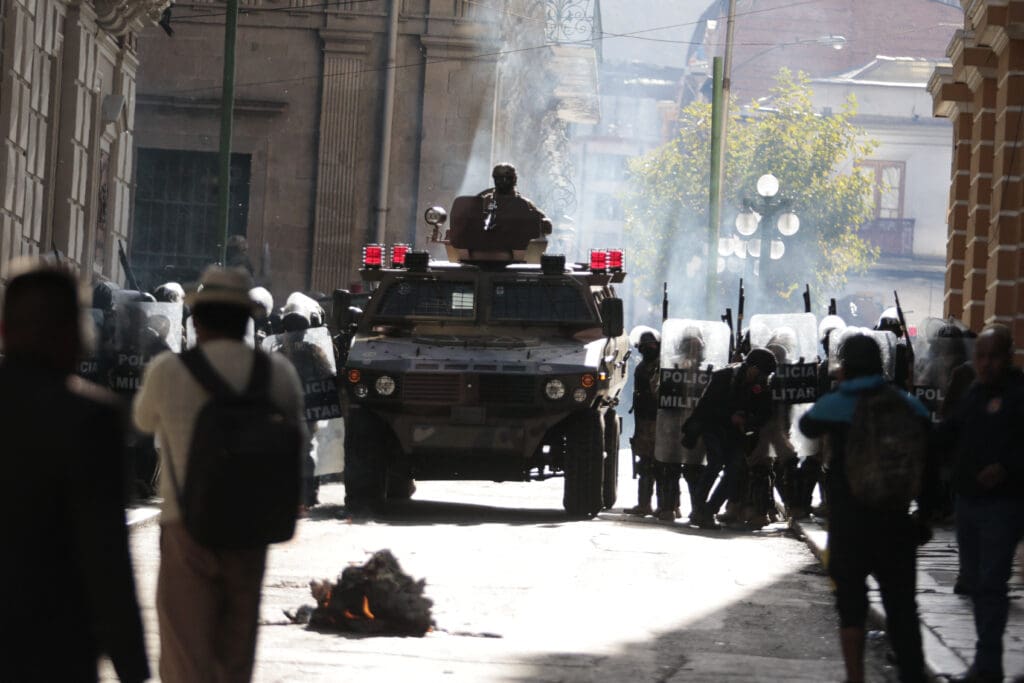The first attempted military coup of 2024 took place in Bolivia on June 26, when soldiers stormed the presidential palace and occupied the main square in La Paz. While Bolivia is no stranger to putsches, with the highest number of coups worldwide since 1950, it is now the latest in a long list of countries where military forces recently sought to overthrow a ruling government.
A coup d’etat involves an abrupt seizure of power, typically by the military. Over the past five years, such events took place across Africa between 2019 and 2023, including in Niger, Burkina Faso, Guinea, Guinea-Bissau, Mali, Gabon, Chad, Sao Tome and Principe, and Sudan, and Myanmar in 2021. This global wave of coups sparked renewed interest in the role of the armed forces in politics and in the implications of their attempts to seize control.
What are the drivers and implications of this wave? Proliferating coups often lead to democratic backsliding and are symptomatic of instability. Given the persistent political weaknesses in the countries in which they took place, recent coups raise questions about the future of democratic progress in these contexts. Yet, despite widespread political disillusionment and growing military popularity, democracy still retains broad public support, including among citizens of coup-stricken countries.
Coup Leaders Target Weak Rulers
Why are coups attempted? Historically, newly independent countries, new rulers, and transitioning regimes have proven susceptible to coup attempts owing to political instability, weak institutional foundations, economic hurdles, and external interference. For example, during the 1950s and 1960s, military leaders came to power in Algeria, Egypt, Syria, Nigeria, and Uganda mere years after these countries obtained their independence. These nations emerged from colonial rule with fragile political frameworks and nascent institutions, which made them vulnerable. Internal power struggles among military and political factions compounded this vulnerability.
In the 1970s and 1980s, several new rulers across regions faced coups. During this period, in countries like Ghana, Uganda, Chile, Libya, Syria, and Algeria, regimes struggled with political and economic challenges as well as external interventions seeking to influence regional dynamics. Amidst these conditions, coup leaders attempted to seize upon perceived weaknesses to assert control and shape the trajectory of these fledgling regimes.
Recent coups that occurred in Bolivia, Myanmar, and across Africa share similar drivers. They took place against a backdrop of instability, political chaos, and socioeconomic grievances. In Burkina Faso, as an Islamist insurgency spread in the northern and eastern regions, Captain Ibrahim Traoré overthrew the interim President Paul-Henri Sandaogo Damiba in 2022 amidst dissatisfaction over his handling of security and economic issues. Damiba himself had come to power via a coup that same year. In Thailand, after six months of political deadlock and protests, the Royal Thai Armed Forces, led by General Prayuit Chan-o-cha, overthrew the caretaker government in 2014 and established a junta to govern the country. In 2021, the Guinean armed forces captured President Alpha Condé, dissolved the constitution and government, and appointed a military officer as interim president. Condé had been losing popularity due to public economic grievances, an attempt to run for a third term, tax hikes, and heightened repression against protestors.
Modern Coups Undo Democratic Progress
Why do coups elicit concern? First, most have led to some degree of democratic backsliding. In fact, several cases of military takeover constituted a direct threat to new democracies. Egypt’s first democratically elected president, Mohamed Morsi, was removed from power by the military leadership in 2013, one year after being elected in the country’s first free election. This event marked a return to military-backed authoritarianism in Egypt.
Coups also threaten transitional governments. In less than a year, Mali experienced back-to-back coups, culminating in Colonel Assimi Goïta seizing power from civilian transitional leaders in 2021 and prolonging military rule in the country as of 2022. In Sudan, General Abdel Fattah al-Burhan dissolved the transitional government and arrested civilian leaders in 2021, resulting in armed fighting that continues today.
Some coups threaten democratic progress by overturning election results. Most recently, in Myanmar, the military seized power in 2021 after deposing members of the ruling party and nullifying the 2020 general election in which the military’s proxy party was defeated. This coup created a cycle of instability and repression characterized by deadly clashes between the military junta and anti-coup protesters.
It is not just recent coups that hindered democratic rule; similar events that transpired decades prior to this current wave have had similar effects. Myanmar’s coup is reminiscent of one that took place in Algeria in 1992, when the army leadership canceled elections that an Islamist party was on the cusp of winning, leading to a decade-long and bloody civil war. In the aftermath of a military takeover in Chile in 1973 that ended forty years of democratic governance, thousands of civilians were killed, disappeared, and tortured, and the country fell under authoritarian rule. As early as 1949, modern Syria’s first coup overthrew a democratically elected government and primed the country for a cycle of coups and military rule.
Even failed coups can halt democratic progress or lead to autocratization. In Türkiye, an attempted coup in 2016 against President Recep Tayyip Erdogan triggered a severe crackdown on perceived dissenters. Failed putsches in Morocco in 1971 and 1972 set in motion the most repressive years of King Hassan II’s rule.
The Resurgence of Coups Is a Wakeup Call, but Support for Democracy Prevails
Recent and historical events show that coups threaten democratic institutions—whether they succeed or fail. When coups succeed, they usher in military dictatorships, societal upheaval, and conflict. When they fail, they often result in heightened repression and prolonged instability.
When considering findings about public disillusionment, positive public perception of the military, and low trust in political institutions, one may wonder whether people support military intervention as a method of political change. Despite their frequency, coups are not popular. Across Africa, for example, survey data have shown that people perceive post-coup political and economic developments negatively, including in countries where there was initial public support for coups. Furthermore, in the Middle East, Africa, and Latin America—regions where coups were attempted frequently and where a majority of surveyed citizens expressed significant trust in the armed forces—most people perceive democracy as the best system of government. This not only highlights the enduring appeal of democratic governance but also the imperative to safeguard it against the destabilizing forces of military intervention.


